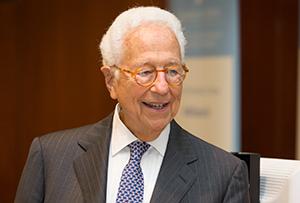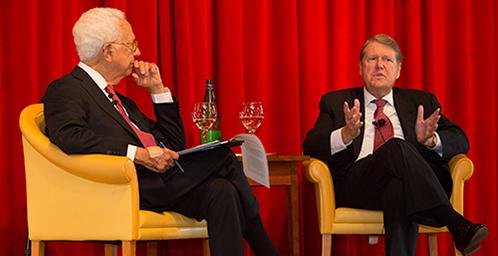Millstein Center Hosts International Forum on Capital Market Changes and Corporate Governance
Two-Day Event at Columbia Law School Draws Hundreds of Leading Corporate Governance Experts from Industry, Institutional Investors, and Academia
New York, July 2, 2014—Are activist investors a constructive or destructive force in the world of corporate governance? How have institutional shareholders responded to their presence? And how have the disparate goals of a diverse set of shareholders impacted companies’ decision making? Experts from around the world gathered at Columbia Law School recently to discuss these questions and more at the 9th annual Millstein Governance Forum presented by the Ira M. Millstein Center for Global Markets and Corporate Ownership.
| Ira M. Millstein '49 welcomes guests at the 9th annual Millstein Governance Forum on "The State of Corporate Governance." |
The June 12-13 forum, “The State of Corporate Governance,” brought together 200 leading regulators, investors, academics, corporate directors and executives for engaging discussions about the changing shareholder landscape. Three decades ago, the majority of shareholders were “retail” investors who generally left decision making up to company leaders. Today, shareholders are predominantly large, institutional investors who bring a sophisticated understanding of a corporation’s performance and potential. The forum featured intense debates among corporate governance leaders over whether these changes have been good for investors—and their implications for the future of the global economy.
Confronting the Changing World of Corporate Governance
The 2014 Millstein Governance Forum included three plenary discussions on, respectively, the state of capital markets, the state of investors, and the consequent state of corporations and six breakout sessions on topics ranging from international accountability and enforcement to proxy season updates. The event was sponsored by Deloitte; the CFA Institute; the IRRC Institute; Weil, Gotshal & Manges; Broadridge; and the Center for Audit Quality.
At the first plenary, “The State of Capital Markets,” moderated by Columbia Law School Professor and former SEC Commissioner Harvey J. Goldschmid ’65, panelists offered perspectives on how companies raise capital amidst economic tumult, changing regulatory environments, and rapidly evolving technologies. While they agreed that these changes have introduced much uncertainty to the process, they argued that the market has become more efficient and transparent and that firms operate more strategically now than in decades past. The experts also examined in-depth the gradual decline in IPOs as young firms increasingly turn to debt financing and private equity rather than go public.
Millstein Center Co-Director and Columbia Law School Professor Robert J. Jackson Jr. moderated the second plenary discussion, “The State of Investors.” The panelists debated the merits of activist investors and discussed whether their contributions to corporate governance are positive or negative. The panel included discussion of a provocative essay recently published on the Law School’s Blue Sky Blog on activist investor tactics, “The Sotheby’s Poison Pill Case: The Plate Tectonics of Delaware Corporate Governance,” by Columbia professors Ronald J. Gilson and Millstein Center co-director Jeffrey N. Gordon.
| Professors Harvey J. Goldschmid '65, Jeffrey N. Gordon, and Robert J. Jackson Jr. share their perspectives on the changing shareholder landscape and the future of the global economy. |
“We are about to see the management and shareholder plates of corporate governance geology collide sharply,” Gilson and Gordon write. “The change in the ownership distribution makes all the difference, because large investment intermediaries have both a significant ownership stake in their portfolio companies and sufficient diversification to allow for knowledgeable observation of an activist’s behavior across many governance targets. Institutions, unlike diffuse shareholders, can observe repeat play. Activists can acquire a reputation that reverses the prior presumption about the pursuit of private benefits.”
Gordon also moderated a breakout session on how the private fund universe, hedge funds, and private equity firms are adapting to changing investor expectations post- financial crisis. On the one hand, the largest public pension funds are seeking to “co-invest” with private equity funds to take advantage of concentrated positions and lower fees. On the other, hedge funds and private equity firms are looking to create products for the retail market. Hedge funds also have proven themselves to be adaptable proponents of non-correlated investment strategies, such as activist investing.
In the final plenary, “The State of the Corporation,” moderated by Ira M. Millstein ’49, co-chair of the Millstein Center Advisory Board and a senior partner at Weil, Gotshal & Manges, panelists discussed the impact of institutional investors on corporate decision-making, including whether investors exert pressure that promotes “short-termism” and the fact that retail investors and their institutional counterparts have different, sometimes competing goals.
In addition to the plenaries and breakouts sessions, the forum featured a keynote lunch in which Millstein and Russell L. Carson, co-founder and general partner of private equity firm Welsh, Carson, Anderson & Stowe, discussed the role of private equity in the capital markets. Originally private equity firms put a greater emphasis on longer-term investments but, under pressure from investors, that has given way to a focus on shorter-term returns. Private equity firms consistently try to improve value while reducing debt and earning a profit for the risks undertaken, the pair said.
| At the forum's keynote lunch, Millstein and Russell L. Carson of Welsh, Carson, Anderson & Stowe explore in-depth the evolving role of private equity in capital markets. |
Bridging the Gap Between Research and Real-World Issues
Panelists at this year’s forum included Pershing Square Capital Management Partner Paul C. Hilal; Third Point Partner, Chief Operating Officer, and General Counsel Joshua L. Targoff; Miller Buckfire & Co. Chairman Harvey Golub; and Wachtell, Lipton, Rosen & Katz Founding Partner Martin Lipton, among many other prominent practitioners.
The forum also featured a reception honoring recipients of the Millstein Center’s Rising Stars of Corporate Governance Award, which recognizes global corporate governance professionals under the age of 40 who are making their mark as outstanding analysts, experts, directors, managers, or advocates. The 2014 Rising Stars are: Alissa Amico, Project Manager, Corporate Governance, MENA Region, Organisation for Economic Co-operation and Development (OECD); Bariș Dinçer, Managing Partner, ARGE Consulting; Board Member, Corporate Governance Association of Turkey; and Oleg Shvyrkov, Director, Corporate Governance, Deloitte & Touche CIS.
The Millstein Center for Global Markets and Corporate Ownership conducts timely research on crucial real-world issues. The center studies the changing relationships between investors and corporations and is currently working on two key projects that will advance understanding of those relationships. First, the center is producing a first-of-its-kind census of institutional shareholders that will provide a new look at who these investors are, how they are governed, and how they can be expected to behave, so that corporate directors can use data rather than assumptions to understand who their owners are. Second, the center is developing a publicly available online database of the corporate governance characteristics of U.S. public corporations.
The center pursues its mission and goals by sponsoring and undertaking pertinent academic research; teaching courses and hosting on-campus guest speakers; convening conferences, workshops, and roundtables; publishing papers and briefings based on research or events; and facilitating vital market institutions or networks as needed. For more information about the Millstein Center, please visit: http://web.law.columbia.edu/millsteincenter, or follow the center on Facebook or Twitter.


